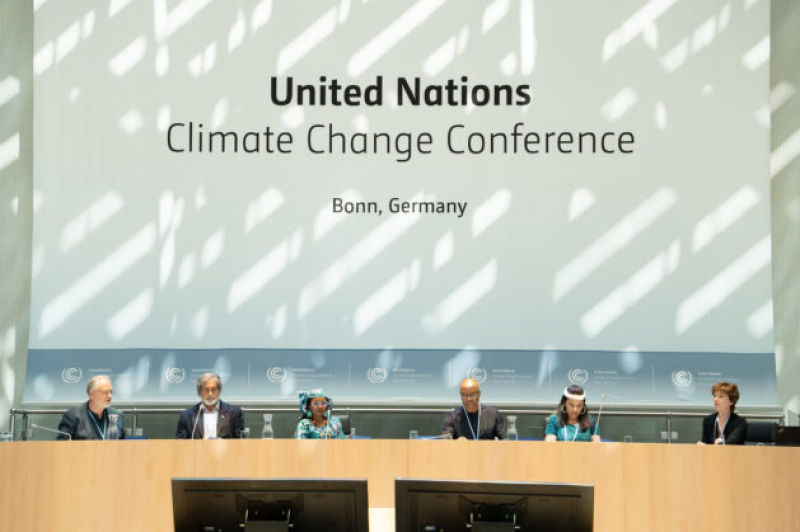- Puppet show enchants Children as Boi Mela comes alive on day 2 |
- DSCC Admin Salam’s drive to make South Dhaka a ‘clean city’ |
- 274 Taliban Dead, 55 Pakistan Troops Killed |
- Now 'open war' with Afghanistan after latest strikes |
- Dhaka's air quality fourth worst in world on Friday morning |
Bonn Climate Talks Expose Urgent Gaps in Global Action

The June Climate Talks, SB62 under the UNFCCC, in Bonn 16-26 June.
The 62nd meeting of the Subsidiary Bodies (SB62), held from 16 to 26 June 2025 under the United Nations Framework Convention on Climate Change (UNFCCC), highlighted persistent political tensions and structural inefficiencies in global climate negotiations.
Often dubbed a “mini-COP,” SB62 serves as a crucial mid-year checkpoint ahead of the 30th Conference of the Parties (COP30), scheduled for November in Belém, Brazil. While modest progress was achieved on adaptation and procedural matters, major areas such as climate finance, technology transfer, and scientific assessments remained mired in disagreement.
The conference brought together national delegations, UN agencies, civil society, Indigenous representatives, and youth groups. The Subsidiary Body for Implementation (SBI) tackled operational issues like finance and capacity-building, while the Subsidiary Body for Scientific and Technological Advice (SBSTA) addressed technical matters such as carbon markets under Article 6 of the Paris Agreement.
Brazil, as the upcoming COP30 host, sent the largest delegation—173 participants—signalling its ambition to shape the agenda. Its presidency prioritised reinforcing multilateralism, connecting climate decisions to people’s lives, and accelerating Paris Agreement implementation.
However, the session opened with a two-day delay in adopting the agenda, sparked by disputes over including developed nations’ finance obligations under Article 9.1 of the Paris Agreement. This early deadlock set the tone for a tense, fragmented round of talks.
Adaptation negotiations yielded a refined list of global indicators, particularly regarding access to climate financing—a long-standing demand from developing countries. Discussions also moved forward on transitioning the Adaptation Fund fully under the Paris Agreement and refining loss and damage reporting protocols.
Nonetheless, finance remained the most divisive issue. The new collective quantified goal (NCQG) of USD 300 billion, established at COP29 in Baku, was met with scepticism by developing nations, who cited unpredictability and inadequacy in existing funding flows.
Scientific dialogue also proved politically charged. While parties agreed to “take note” of recent reports from the World Meteorological Organization, proposals to formally acknowledge alarming warming trends and reinforce the 1.5°C target were blocked by some delegations.
Jennifer Chow, Senior Director at the Environmental Defense Fund, highlighted institutional shortcomings in an interview. She criticised the proliferation of agenda items and oversized delegations, suggesting that some issues no longer require negotiation and could be delegated to technical bodies.
“We need to streamline processes and give more leadership roles to Small Island Developing States (SIDS) and Least Developed Countries (LDCs),” she said. “The focus should shift to implementation and evidence of progress, particularly toward 2030 goals.”
Chow also warned that constant renegotiation erodes trust and slows action.
Meredith Ryder-Rude, also from the Environmental Defense Fund, pointed to deep-rooted disagreements over what types of funding should be counted toward adaptation goals.
“There’s no dispute over the need for more adaptation finance, but countries still disagree on what qualifies as effective funding,” she said.
She underscored the need for capacity building at the local level, citing successful examples of national aggregators disbursing small grants and mentoring community groups to manage larger funds over time. Ryder-Rude advocated for more flexible, trust-based finance mechanisms that reflect on-the-ground realities.
With COP30 looming, the outcomes of SB62 underscore the need for bold, coordinated action. Issues expected to dominate the COP agenda include finalising rules for carbon markets, operationalising the NCQG, and translating adaptation frameworks into tangible support.
Countries were expected to submit updated Nationally Determined Contributions (NDCs) aligned with the 1.5°C target by February 2025. However, 95% missed the informal deadline, raising questions about transparency and commitment.
Brazil’s presidency faces increasing scrutiny over inclusiveness and its proposed "Circle of Finance Ministers," tasked with crafting a new finance roadmap. Concerns over Belém’s capacity to host the summit and geopolitical tensions—such as the absence of a formal U.S. delegation—add further complexity.
Rebuilding trust, simplifying negotiations, and empowering vulnerable nations remain central to restoring credibility and momentum within the UNFCCC process.

